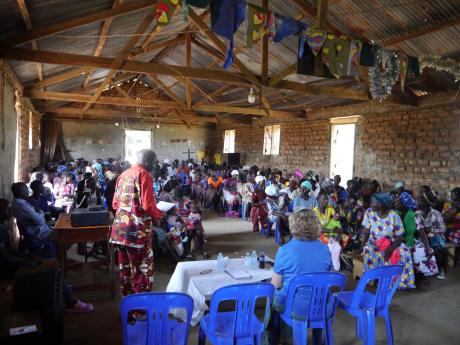MAF flies professional midwives to help curb maternal mortality in Soroti, Eastern Uganda.
Mission Aviation Fellowship flew International Midwives Assistance (IMA) staff from Kajjansi Airfield to Soroti, in the east of Uganda, to help local families appreciate the need for medical care when giving birth.
It was discovered that the vast majority of the women in Katine village are delivering their babies with traditional birth attendants (TBAs), and many of them have lost their lives due to haemorrhage (bleeding) or pre-eclampsia (high blood pressure).
''Mission Aviation Fellowship has been a huge blessing to us. We've brought so many volunteers from the United States, doctors, nurses — into Soroti, in fact, it's not very far by kilometres, but there are many challenges along the road, and it is not always safe,'' said Jennifer Braun, the Executive Director of IMA.
Mission Aviation Fellowship has been a huge blessing to us.
A MAF plane reached Soroti in only 40 minutes, while travel by road to the same place takes about five hours.
According to the World Health Organisation, Uganda's maternal mortality rate currently stands at 189 deaths per 100,000 live births. Soroti is in Teso, a region with high maternal mortality, reporting 63 maternal deaths in 2023.
The national health report of 2022/2023 indicates that the highest number of maternal deaths are caused by haemorrhage and preeclampsia. Haemorrhage accounts for 40% of maternal deaths in Uganda, while preeclampsia is the second leading cause of deaths, accounting for 16% of maternal deaths.
Jennifer Braun and her team have been working on educating women about the risks of home births.
"Now we do these big conferences, we meet with the families, the women, and discuss what kills women in pregnancy and childbirth, and what interventions can be taken to save their lives," said Jennifer.
At Katine Church of Uganda, 15 kilometres from Soroti Town, 230 locals attended the training, where the aim was to help mothers appreciate the importance of antenatal visits during the nine months of pregnancy, and delivering their babies in hospital.
Nearly all women confessed to giving birth from home, by using low-cost but unskilled TBAs from their communities. Some mothers’ babies have died in their hands.
The women in this area face a lot of challenges during childbirth.
In Soroti, reports indicate that approximately 40-50% of women give birth at home, often with little to no medical supervision.
''The women in this area face a lot of challenges during childbirth. A lot is due to living remotely. When the woman lives in the village, the roads can become impassable due to rains, and they can be dangerous,'' explained Jennifer.
"A lot of these women, after giving birth, lose a significant amount of blood. Since they are at home, by the time they reach the health centre, they have lost a great deal of blood, which often leads to fatalities.”
Financial constraints and long distances to hospitals hinder mothers from seeking proper medical help.
“The problem I have faced while giving birth from home is that nobody can take care of bleeding. Too much bleeding, but nobody can take care of it, and there is death. God has protected me," said Naume Agwero, who attended the Village Women Conference.
"The teaching has taught me that I am supposed to go to the hospital. I will not repeat giving birth from home. I have known the danger of giving birth from home. Good enough, this project has brought a vehicle, which is an easier way of going to the hospital.”
Richard Ocen, head of research at IMA noted that, "Women who give birth from home get problems with a lot of bleeding. They delay at home to come to the facility because they do not have money for transport,"
The two main killers — haemorrhage and preeclampsia — can often be countered effectively with timely medical intervention.

"Women often die due to isolation, living in remote areas, lack of access to transportation, and poor road conditions," Richard said.
Denis Esudu, shared a tragic story, underscoring the urgency of these interventions.
''My first wife died from high blood pressure. We delayed and the baby died as soon as we reached the hospital. Not long after, my wife died as well,'' he said.
My first wife died from high blood pressure.
IMA is also building a clinic that will offer free services and facilitate safe delivery for mothers. The project is also operating a vehicle to transport mothers to the clinic for delivery.